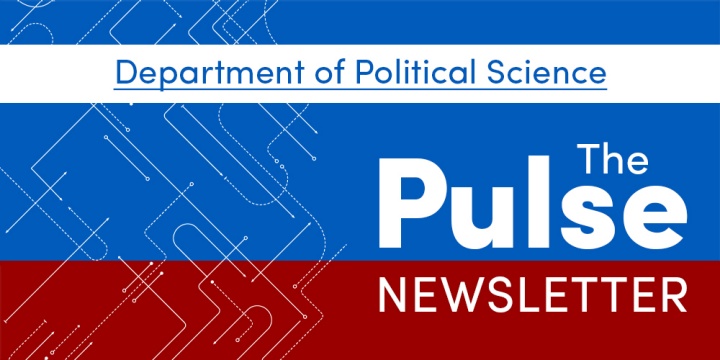
Issue 10, 2024
In this Issue:
Support your Department
Dear Alumni and Friends of the Department of Political Science,
Two years ago, the Department embarked on a strategic plan to identify a direction for growth. As a department that has long valued scientific, quantitative, and mathematical approaches to the rigorous study of politics, we sought to leverage these strengths by investing in a new topical direction that seeks to understand both enduring challenges to democracy, elections, and related political phenomena.

Issues of election reform, electoral integrity, and the specter of electoral violence have never been more central to the functioning of democracy both in the U.S. and abroad. In the U.S., recent years have witnessed efforts at expanding methods for “convenience voting,” as the country conducted an election amidst a global pandemic, a push for voter ID policies, and an attack on the Capitol motivated by a desire to overturn the presidential election results. Globally, elections have served as beacons of hope for the progress of democracy in regions where democratic institutions are nascent. Yet, elections are also often vulnerable to manipulation by illiberal leaders and violence perpetuated by opportunistic groups. Thus, while elections are a central pillar of democratic legitimacy and consolidation, they can also serve as targets for instability incited by groups intent on bringing about democratic backsliding.
As such, elections are central to democratic processes both at home and abroad. Yet, not until recently have American elections scholars needed to contend with significant threats of electoral violence, thereby limiting our understanding of its correlates. As such, there is much that American election scholars can learn from scholars who focus on electoral contests in other nations. This unprecedented time in the history of American elections calls for a team of researchers to grapple with the lessons of the last presidential election—placed within its global context—and apply them to the problems faced by election administrators in an era marked by extraordinary partisan polarization.
In the past year, the Department of Political Science has begun the process of realizing this vision by building upon our existing scholarly strengths in American Politics, Public Law, and Comparative Politics. With support from Provost Scott Weber and Dean Robin Schulze, the Department has embarked on path to hire notable scholars with strong academic credentials in the study of democracy and election processes.
To that end, the Department of Political Science has welcomed Drs. Tim Hellwig and Conor Dowling to our faculty this year. Dr. Hellwig comes to us by way of the University of Indiana. He received his PhD from the University of Minnesota, and he studies Comparative Politics with a focus on globalization, economic policy, and public opinion across a variety of country contexts. Dr. Dowling was most recently a professor at the University of Mississippi and received his PhD from Binghamton University. He studies mass and elite political behavior in the American system, focusing specifically on electoral competition, representation, and public policy. This year, we are seeking to hire a third faculty member cut from the same cloth as these two prominent hires. We plan to hire again next year in this vein as well. In doing so, we plan to form a critical mass of acclaimed scholars in this critical field of study.
Importantly, this hiring program is also meant to support President Tripathi’s stated goal of improving UB’s national standing in an effort to be recognized as one of the top-25 public research institutions in the country. With such targeted hires to support our strategic plan, we hope the Department of Political Science will be part of the engine that helps drive this rise in the rankings.
In addition to our recent hiring efforts, the Department remains strong in a variety of other ways. Our newly created Global Affairs BA and MA degree programs are in full swing, experiencing robust growth. Our number of majors remains strong. The graduate program has produced a number of MA and PhD graduates in recent years, including students who have taken academic positions at such institutions as St. Bonaventure, Buffalo State, and Loyola Marymount. Additionally, our students have secured nonacademic public and private sector careers, including analyst positions at the Department of Defense and M&T Bank.
We invite you to consider donating to the department if you wish to support us in our pursuit of greater academic achievements. With the help of our growing alumni base, we will be in an ever-stronger position to achieve our objective of becoming a top-ranked department as the University moves toward its top-25 public university goal.
Jake Kathman
Department Chair and Professor

Nels Otterson, a double major in political science, was awarded the Boren Scholarship. The Boren Award provides support to students who engage in intensive language training abroad. Otterson has an interest in the politics of Africa, specifically Senegal. Otterson will live and study in Dakar, Senegal, under the African Flagship Languages Program.
Derek Ong, a PhD student in political science, received the Excellence in Teaching Award for Graduate Teaching Assistants awarded by the UB Graduate School. Derrick teaches courses on International Futures and International Political Economy. His research interests focus on international political economy, particularly on the effects of institutional quality and natural resources dependence on foreign direct investment (FDI) and FDI-led economic growth. This is a university-wide distinction, and he was just one of ten recipients for the 2022-2023 academic year. This award is given each year “in recognition of exceptional ability in teaching by UB graduate students. Students are selected based on superb and creative performance in the classroom or laboratory, engagement with mentoring and advisement, and a commitment to the high academic standards in teaching.”
Kristin Cruz, a PhD student in political science, was the recipient of the Senese Award for the 23-24 academic year. The Senese Award celebrates our students' academic excellence and honors Professor Senese who was a highly accomplished and very promising scholar in International Politics who joined the Department in 1998 and passed away in 2006. This graduate assistantship is named in his memory and reflects Paul’s commitment to UB, political science, its graduate students, and the study of international politics. Kristin’s research focuses on child soldiers in civil wars. Specifically, she is interested in the relationship between post-war amnesties granted to former child soldiers or leaders of the groups that conscript them and the stability of peace. Before coming to UB, she taught American history courses at Niagara University and Niagara County Community College for eight years. At UB, she taught human rights. Upon completing her doctorate, she hopes to work for an organization utilizing reparative justice measures to address issues of inequity in the United States.
Professor Shawna Metzger is the recipient of the 2023-2024 Harvey Starr Award. This award is endowed by Dr. Harvey Starr, who received his BA in 1967 from UB. The stated purpose of the award is to assist in “retaining junior faculty in the Department of Political Science.” Professor Metzger's research and teaching mainly pertain to political methodology. She plans to use the award for computer upgrades and to support her attendance at the annual meeting of the Society for Political Methodology, where she intends to present an ongoing research project examining the Cox duration model’s proportional hazard test.
Professor Carla Martinez Machain was the recipient of the ISA Quincy Wright Distinguished Scholar Award. This award is given annually to a scholar who has significantly influenced the ISA-Midwest region. The recipient is selected for having “an exceptional record of scholarship in international studies, a distinguished record of service to the International Studies Association and other international affairs organizations, and normally, a record of service within the region.
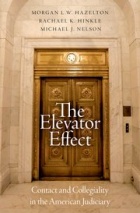
"The Elevator Effect: Contact and Collegiality in the American Judiciary."
Rachael Hinkle has coauthored a book published by Oxford University Press, examining how interpersonal relationships among judges impact their decision-making. They present a comprehensive, first-of-its-kind examination of the importance of interpersonal relationships among judges for judicial decision-making and legal development. Regarding decision-making, the authors demonstrate that more frequent interpersonal contact among judges diminishes the role of ideology in judicial decision-making to the point where it is both substantively and statistically imperceptible. This finding stands in stark contrast to judicial decision-making accounts that present ideology as an unwavering determinant of judicial choice. With regard to legal development, the book shows that collegiality affects both the language that judges use to express their disagreement with one another and the precedents they choose to support their arguments. Thus, the overriding argument of The Elevator Effect is that collegiality affects nearly every aspect of judicial behavior. The authors draw on an impressive and unique original collection of data to untangle the relationship between judges' interpersonal relationships and the law they produce. The Elevator Effect presents a clear and highly readable narrative backed by an analysis of judicial behavior throughout the U.S. federal judicial hierarchy to demonstrate that the institutional structure in which judges operate substantially tempers judicial behavior. Written in a broad and accessible style, this book will captivate students across a range of disciplines, such as law, political sciences, and empirical legal studies, as well as policymakers and the public.
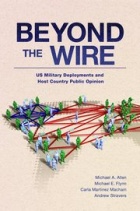
"Beyond the Wire: U.S. Military Deployments and Host Country Public Opinion"
Carla Martinez Machain has coauthored a book published by Oxford University Press examining the political, economic, and social impact of U.S. troop deployment abroad. They argue that the U.S. has entered into a "Domain of Competitive Consent" where overseas deployments' longevity relies upon host-state populations' buy-in and what other major powers offer in security guarantees. Drawing from three years of surveys and interviews across fourteen countries, they demonstrate that a key component of building support for the U.S. mission is the service members themselves as they interact with local community members. Highlighting both the positive contact and economic benefits that flow from military deployments and the negative interactions like crime and anti-base protests, this book shows in the most rigorous and concrete way possible how U.S. policy on the ground shapes its ability to advance its foreign policy goals.
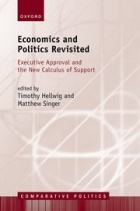
"Economics and Politics Revisited: Executive Approval and the New Calculus of Support"
Timothy Hellwig coauthored an edited volume that was also published by Oxford University Press. In this edited volume, the authors use data from the Executive Approval Project (EAP), a cross-nationally comparable data on leader popularity, to model the fundamental dynamics of government support in advanced industrial democracies. Eleven country-specific chapters, each written by experts in the politics of the country, examine the role of economic performance in generating leader support in each country. In all cases, chapter authors show that the economy matters for popularity. However, the economy-popularity link is stronger in some countries than others. Further, chapters leverage the EAP series to highlight change over time. Pooled analyses extend these findings, highlighting how the public's responses to the economy are reduced when political campaigns shift to non-economic issues and when parties are polarized on non-economic issues. Collectively, the volume highlights how evolving issue agendas are changing the nature of political accountability in advanced industrialized democracies. While the economy remains important, the book calls on students of political accountability to give greater attention to the role of non-economic issues.
In one sense, war most certainly is not a game. People’s lives are at stake. But a branch of mathematical thinking named ‘game theory’ can help us understand relationships between warring states and how to best navigate them by treating their interactions as ‘games’. This could help us avoid ever recreating the near human suicide of Mutually Assured Destruction and could help us find a way out of the Russia-Ukraine war and the tensions between China and the U.S.A., writes Frank Zagare.
Following the Supreme Court’s ruling which overturned Roe V. Wade, there has been fresh concern that subsequent cases may also overturn the right to same-sex relationships and marriage. In new research, Jacob R. Neiheisel and Paul A. Djupe examine the link between changing attitudes towards gay rights and Americans’ declining religiosity. They find that increasing support for same-sex marriage over time is linked to falling attendance in houses of worship. Conflict within congregations which may increase following a new Supreme Court ruling, they argue, may cause more people to leave the organized religious services that they feel they no longer fit.
International Studies Quarterly, the flagship journal of the International Studies Association, is being housed in the Department of Political Science at UB beginning January 2024. Professors Sam Bell and Elena McLean will serve as co-lead editors and Professors Vesna Danilovic and Carla Martinez Machain are serving as associate editors. ISQ is one of the top journals publishing research on international studies.
Professor Elena McLean served as the moderator during a lecture with former U.S. Ambassador to Ukraine Marie Yovanovitch. The conversation covered topics ranging from broader questions about U.S. diplomacy to the specifics of her experience serving as Ambassador to Ukraine and the current conflict with Russia.

Conor Dowling on Local Politics
Carla Martinez Machain on U.S. Foreign Policy
Jacob Neiheisel on U.S. elections and politics
Shawn Donahue on U.S. elections and courts
Collin Anderson on the Russia-Ukraine War
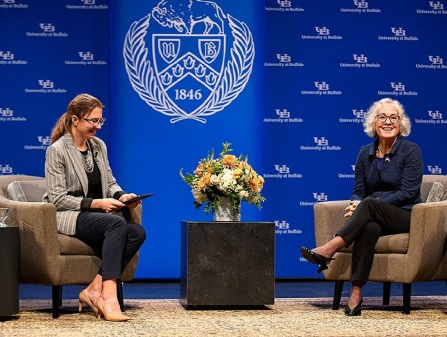
During her appearance at UB, Marie Yovanovitch (right) answered questions posed by moderator Elena V. McLean (left). Photo: Joe Cascio
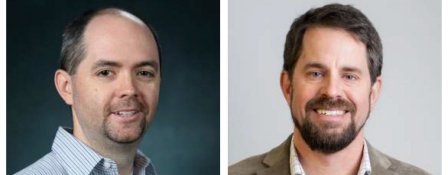
Professor Conor Dowling (left) and Professor Timothy Hellwig (right).
Meet our New Faculty Members
The department is excited to introduce two new faculty members, Conor Dowling and Timothy Hellwig.
I’m excited to join the department at the University at Buffalo. Prior to this move, I was a faculty member in the Department of Political Science at the University of Mississippi (2012-23) and a postdoctoral research associate in the Center for the Study of American Politics in the Institution for Social and Policy Studies at Yale University (2008-12). I received my PhD and MA in Political Science from Binghamton University and my BA in Political Science from James Madison University. I am originally from western Massachusetts (the small town of Hinsdale in Berkshire County), and I am happy to be back in the Northeast—even if I might not be quite ready to deal with heavy snowfall again.
My research and teaching interests are in American Politics, where I study both mass and elite political behavior with a substantive focus on issues of electoral competition, representation, and public policy, campaign finance law and health policy in particular. I’m looking forward to teaching courses on citizen participation, campaigns and elections, political parties and interest groups, and special topics within the realm of American Politics. I’m also looking forward to teaching substantive and methodological (survey and experiments) graduate courses and, more generally, working with graduate students on research projects. I’m excited to be a part of the department’s continued growth and to have the opportunity to get to know and collaborate with new colleagues.
I teach and do research on political parties, political economy, and political behavior. I am particularly interested in how economic change reshapes how parties and voters relate to one another. The forces of globalization, off-shoring, deindustrialization, and technology-driven change in labor markets and employment systems are bound to matter for policymakers’ ability to deliver on their promises to citizens. These changes, I contend, have wide-ranging consequences for representation. A related interest of mine lies in understanding how these economic changes interact with demographic change to shape people’s opinions on such matters as pensions, health care, and taxation. While much of my work has examined these issues in Europe and North America, I have recently explored these topics across Latin America to see how policy reforms in this diverse region matter for electoral accountability.
This year at UB, I am teaching a graduate seminar in comparative political behavior and the undergraduate survey comparative politics course. In the coming years, I hope to offer courses on capitalism and democracy, populism and anti-system politics around the world, political economy, European politics, and research methods and design. I have collaborated with students as research assistants and coauthors in the past and am excited to continue to do so at UB.
My first impressions of UB and Buffalo have been very positive. I’m happy to be in such a collegial and collaborative department, and I think this is an exciting time at UB. I also look forward to exploring the city. As someone who grew up on playing hockey on frozen ponds and cross-country skiing in Minnesota, I am approaching the coming winter with a sense of cautious optimism!
Below please find a sampling of research, teaching, and service-related accomplishments by the faculty over the last year.
Collin Anderson (clinical assistant professor)
- New Course Developed, PSC 373 - International Futures
- “Comparative Politics in the 21st Century”, Kendall Hunt Publishing
- “The Neo-Chomsky Model: Updating the Classic Model to Modern Times,” Midwest Political Science Conference 2023
Sam Bell (professor)
- Bell, Sam R., and Risa Kitagawa. 2023. “Human Rights Organizations and Transitional Justice Agenda Setting: Evidence from Peace Agreement Provisions.” Conflict Management and Peace Science. 40(1): 65-87.
- Allen, Susan and Sam R. Bell. 2022. “The United Nations Security Council and Human Rights: Who Ends Up in the Spotlight.” Journal of Global Security Studies. 7(4).
- Kitagawa, Risa, and Sam R. Bell. 2022. “The Logic of Transitional Justice and State Repression: The Effects of Human Rights Prosecutions in Post-Conflict States.” Journal of Conflict Resolution. 66(6): 1091-1118.
Michelle Benson-Saxton (associate professor)
- “Punching Before the Bell Rings: United Nations Signaling and Pre-Deployment Violence in Civil Wars.” Forthcoming (with Jacob Kathman and Paul Diehl). International Studies Quarterly.
- “Naming Names: UN Security Council Resolution Sentiment in Civil Wars.” 2022. (with Colin Tucker). For inclusion in the Routledge Handbook on UN Peacekeeping, Ed. Han Dorussen. pp. 74-87.
- “Militarization and Women’s Empowerment in Post-Conflict Societies.” 2022. (with Ismene Gizelis). UN Women. (June 2022): 1-27.
Vesna Danilovic (associate professor)
- “Exogenous Factors and the Crisis Bargaining Process” (with Joe Clare), Conflict Management and Peace Science (2023, forthcoming).
- “The Conditions for War and Peace in Interstate Crises” Conflict Management and Peace Science (2023, forthcoming).
- Serving as associate editor International Studies Quarterly
Shawn Donahue (clinical assistant professor)
- New Course Developed, PSC 422. – Native American Law and Politics
Timothy Hellwig (professor)
- Lawrence Ezrow, Michele Fenzl, and Timothy Hellwig. Forthcoming. “Bicameralism and Policy Responsiveness to Public Opinion.” American Journal of Political Science
- Timothy Hellwig and Matthew Singer, eds. 2023. Economics and Politics Revisited: Executive Approval and the New Calculus of Support. Oxford: ECPR/Oxford University Press(Comparative Politics Series).
- Timothy Hellwig and Dani M. Marinova. 2023. “Evaluating the Unequal Economy: Poverty Risk, Economic Indicators, and the Perception Gap.” Political Research Quarterly 76(1): 253-266.
Rachael K. Hinkle (associate professor)
- Hazelton, Morgan L.W., Rachael K. Hinkle, and Michael J. Nelson. The Elevator Effect: Con- tact and Collegiality in the American Judiciary. Forthcoming at Oxford University Press in June 2023.
- Hinkle, Rachael K. 2023. “Publication and Strategy in the U.S. Courts of Appeals.” 179(1) Journal of Institutional and Theoretical Economics 121-145.
- Participant at the Journal of Institutional and Theoretical Economics Symposium on Machine Learning and the Law, Segovia, Spain: June 2023.
Jacob Kathman (professor and chair)
- “Punching Before the Bell Rings: United Nations Signaling and Pre-Deployment Violence in Civil Wars.” (with Michelle Benson and Paul F. Diehl). Forthcoming in International Studies Quarterly.
- “Sticking it Out: Instability, Regime Type, and Personnel Withdrawals from UN Peacekeeping Operations” (with Molly Melin). Forthcoming in Conflict Management and Peace Science.
- “Ripe for Resolution: Third Party Mediation and Negotiating Peace Agreements.” (with Megan Shannon). 2023. In What Do We Know about Civil War? Sara McLaughlin Mitchell and T. David Mason (eds.). Rowman & Littlefield.
Jieun Lee (assistant professor)
- Lee, Jieun and Jan Stuckatz. Forthcoming. “Mobilization and Strategies: Comparing Trade Lobbying in the U.S. and Canada.” Comparative Political Studies.
- Lee, Jieun. 2023. “Foreign Direct Investment in Political Influence.” International Studies Quarterly. https://doi.org/10.1093/isq/sqad005.
- Lee, Jieun. 2022. “Foreign Lobbying through Domestic Subsidiaries.” Economics & Politics. https://doi.org/10.1111/ecpo.12232.
- Winner of the David P. Baron Award for the best article published in Business and Politics in 2022.
Carla Martinez Machain (professor)
- Outside the Wire: U.S. Military Deployments and the Diplomacy of Defense (with Michael Allen, Michael Flynn, and Andrew Stravers), 2022, Oxford University Press Bridging the Gap Series.
- School of influence: Human rights challenges in U.S. foreign military training, Forthcoming, Conflict Management and Peace Science
- Air Power, NGOs, and Civilian Killings: Exploring the Mechanisms in Afghanistan (with Susan H. Allen and Sam Bell), Forthcoming, Armed Forces and Society
Abigail Matthews (assistant professor)
- Schilling, Emily U., Abigail A. Matthews, and Rebecca J. Kreitzer. “Timing Their Positions: How Bills, Legislators, and Constituents Affect Cosponsorship in State Legislatures.” State Politics & Policy Quarterly
- Harvey Starr Award, University at Buffalo (2022)
- APSA Law & Courts Section Service Award (2023)
Elena McClean (professor)
- McLean, Elena. 2023. “Looking for Advice: The Politics of Consulting Services Procurement in the World Bank.” World Development 161(January):106-117.
- McLean, Elena, Jeheung Ryu, and Taehee Whang. 2023. “The Effect of Economic Coercion on Companies’ Foreign Direct Investment Decisions: Evidence from Sanctions Against Russia.” Conflict Management and Peace Science.
- Invited presentations at UCSD and Arizona State University
Shawna Metzger(assistant professor)
- Metzger, Shawna K. 2023. “Proportionally Less Difficult?: Reevaluating Keele’s ‘Proportionally Difficult.’” Political Analysis 31 (1): 156–163.
- Metzger, Shawna K., and Benjamin T. Jones. 2022. “Getting Time Right: Using Cox Models and Probabilities to Interpret Binary Panel Data.” Political Analysis 30 (2): 151–166.
- Metzger, Shawna K. 2022. “Teaching Econometrics Dynamically with R-Shiny.” PS: Political Science & Politics 55 (1): 225–229.
Jacob Neiheisel (associate professor)
- Neiheisel, Jacob R., and Sarah Niebler. (Forthcoming). “Do Early Voters Try to Mobilize Others?” Election Law Journal
- Djupe, Paul A., and Jacob R. Neiheisel. (2023). “Did Shifts in Same-Sex Marriage Attitudes Drive Down Religious Behavior?” American Politics Research. Vol. 51(1): 81-90.
- Djupe, Paul A., and Jacob R. Neiheisel. (2022). “The Religious Communication Approach and Political Behavior.” Advances in Political Psychology. Vol. 43(1): 165-194.
Antoine Yoshinaka (associate professor)
- Section Chair of the “North American Politics” section of the 2023 MPSA annual meeting
- “La stratégie du Parti (pris) démocrate” La Presse, May 20, 2023
Frank Zagare (UB distinguished professor)
- “Modeling Threats and Promises,” [with D. Marc Kilgour], Journal of Peace Research,
- “War is not a Game, but We should Play it Like one,” iAi News, April 11, 2023
D. Munroe Eagles PhD
Our new newsletter editor, Professor Sam Bell, asked me to contribute something during my retirement from the Department last month. I’m happy to do so. Having served as editor of The Pulse over the past decade, I have been grateful when many of my colleagues and many of our students have responded positively to my invitations to contribute. So, it is only fair that I respond in a similar fashion. I would also like to express my sincere appreciation to Professor Bell for taking over the editorial responsibilities and ensuring that our political science community is kept abreast of developments in the Department. I hope he finds his tenure as editor as personally satisfying as I did mine.
I joined the Department in August 1989 after having taught at a liberal arts college in Halifax, Nova Scotia. In my 34 years at UB, I have had amazing opportunities to teach phenomenal undergraduate and graduate students, to experience life as an academic administrator in various capacities, and to conduct research in political and electoral geography, as well as Canadian and British politics. I cannot imagine any career that would have been more fulfilling for me. I am sincerely grateful for the opportunities the Department and the university have provided. Indeed, for most of my time at UB, I could not conceive of life beyond political science and the university. But my wife has retired for almost a decade now, and I’m eager to join in the fun she has been having! So now I’ve taken the leap into retirement and, for the first time since 1986, I am not teaching in the autumn months.
Retirement does not mean that I’ve completely withdrawn from political science, however. A very welcome and unexpected opportunity to keep my hand in came along in my last year when Paul Bélanger, a former PhD student of mine in UB’s highly-regarded geography program, took early retirement. After relocating and resettling into a new community, he expressed an interest in resuming the work we had engaged in two decades ago. Over the past year, we have been using an exciting statistical approach called ‘multiscale geographically weighted regression’ (MGWR) to explore and explain spatial variations in the 2016 Brexit vote and, more recently, to map the progress of the Brexit-inspired realignment in the British party system. We have presented the results of the latter project at a recent conference (“Elections, Public Opinion, and Parties” section of the UK Political Studies Association) in Southampton, England. British politics was my earliest research interest (and the subject of my PhD thesis), so returning to this work with a much-liked and highly skilled former student has been extremely gratifying, and we intend to continue along this path with other projects. In a further serendipitous twist, the MGWR software we are employing in these studies has been pioneered by a friend and former colleague in the Department of Geography here at UB (Stewart Fotheringham, who is now at Arizona State University).
Beyond continuing to keep my hand in research, my wife and I have also been traveling, and we look forward to using the freedom retirement brings to do much more. In the summer, we had trips to Ottawa, my home province of Nova Scotia, and to Italy (where we were able to share an Umbrian villa with Chris Holoman and his wife Connie and three other couples).
Some will recall Professor Holoman from his years in the Department in the 1990s. He is now serving as President of Centenary College in Shreveport, LA, and our time together in Italy was the first we’ve been able to spend with them since they left Buffalo in 2016. In January, we will pack our bags and spend the remainder of winter with our two dogs in sunny Florida!
So, retirement has gotten off to a very good start! I’m reading novels that have been accumulating in stacks over the years and generally enjoying the empty schedule that confronts me almost every day!
I didn’t get to play enough golf over the summer – something I intend to remedy next year! Of course, I will also be sure to follow the accomplishments of my incredible friends and colleagues in the Department, and of our wonderful alums, with great interest and pride. I look forward, therefore, to remaining in touch with you all in the years to come.
Dr. Lisa Parshall, PhD ’01 Named Distinguish Professor at Deamen University
Dr. Lisa Parshall, a professor of political science, has been promoted to the rank of Distinguished Professor at Daemen University, the highest professorial rank awarded to faculty.
Nicholas Seabrook was promoted to Full Professor at the University of North Florida
Dr. Seabrook was promoted from associate to full professor of political science at the University of North Florida and, since 2021, has been serving as the chair of the Department of Political Science and Public Administration. His second book, “One Person, One Vote: A Surprising History of Gerrymandering in America,” was released in 2022 by Penguin Random House and was named among the “Best Books of 2022” by The New Yorker. In December 2023, Dr. Seabrook will begin a new role as the Director of the Office of Public Policy Events at UNF.
Annika Hagley is serving as Associate Dean of the School of Social and Natural Sciences at Roger Williams
Annika Hagley (PhD 2010) currently serves as the Associate Dean of the School of Social and Natural Sciences at Roger Williams University after ten years as a professor in their Department of Political Science and International Relations. During that time, Dr. Hagley published a co-authored book, “Reborn in Crisis,” several peer-reviewed journal articles, and several opinion/content pieces in periodicals, including for The Guardian and Newsweek.
Fait Muedini Endowed Professor of International Studies at Butler University
Fait Muedini (PhD 2010) is the Frances Shera Fessler Endowed Professor of International Studies at Butler University. He is currently at the end of his second term as Director of the International Studies Program. Fait Muedini has published three academic books: “Human Rights and Primary Education with Palgrave Macmillan, Sponsoring Sufism: How Governments Promote 'Mystical' Islam in their Domestic and Foreign Affairs” (also with Palgrave Macmillan), and his most recent academic book, “LGBTI Rights in Turkey: Sexuality and the State in the Middle East” with Cambridge University Press. Muedini has also published two books for poetry: “Idolatry of the Translated Forms” (a book of mystical non-duality poems) and “The Muses Will Love You Dearly” (a book on the creative process), both with Kennedy & Boyd.
Kelsey Ryan starts new business
Written by Kelsey Ryan
I attended U.B. for my Political Science MA and PhD and graduated in 2014. I studied American Politics, Judicial Politics and Research Methods. Now, I'm a manager in healthcare analytics consulting, I own and operate Snyder Track and Field, and I’m an assistant cross country/ track and field coach at Daemen University.
One thing I've noticed is that non-professional degrees rarely get the recognition they deserve. Many students are looking for a crystal-clear life and career path and want the degree that will get them the job. But, success rarely comes in linear ways.
My original career goal was to be a college professor. I had the privilege of teaching as a graduate student and later as a Visiting Assistant Professor at Le Moyne College. I loved teaching (so much so that I still teach classes occasionally at Daemen). It was a career I could have done for the rest of my life. But, a pregnancy and a thin local job market changed things. So after a brief stint as “stay-at-home Mom,” I found a great opportunity at Univera Healthcare doing analytics. I learned about claims data and answered questions like “Who are the people going to the Emergency Room the most?”
This job was stable and had great benefits. But during the pandemic, I decided to see what else was available in the work-from-home environment. I’m now in healthcare consulting, where I have a lot of flexibility for my family and my entrepreneurship.
I started my business, Snyder Track and Field in 2020 as a small 6-week track program for my kids and their friends to do during the pandemic. We sold out quickly, and it became clear there was a market for youth track and field. We now offer classes, 1-day clinics, club teams, and private coaching across WNY for kids ages 3-18. This year, we took a big step and secured our own facility which will hopefully open this winter in Williamsville, depending on the planning board and permitting. (Despite the political science degree, I can't convince the local government to go easy on me!) Within the facility, we will have high jump, long jump, youth pole vault, throwing cages, laser-timed sprint lanes, and open space for running and games. And we plan to offer classes, clinics, summer camps, club teams, open gym time and facility rentals.
I have 12 part-time coaches, and I manage hiring, training, payroll, the website, social media, taxes, scheduling, marketing, customer satisfaction, insurance, and all the other fun things that come with business ownership. We’ve been able to introduce track and field to over 600 families so far, and we plan to expand youth classes to Rochester and Syracuse within the next 2 years. Maybe franchising is in our future too.
My degree definitely helped me get into a data analytics career. And my resume is routinely highlighted by my company in sales proposals since it looks great for our firm to have a PhD on staff. While my goal is to eventually leave healthcare consulting and manage Snyder Track and Field full-time, this career has given me financial freedom and allowed me to grow my business in a lower stress environment.
For Snyder Track and Field, the political science degree has proven useful by getting me to view things from an analytical lens and make data-driven business decisions. My favorite class to teach was always Media in Politics, and I can’t overstate how relevant that material is for marketing and social media. Political Science helped me understand human behavior, and I use that knowledge in every aspect of my business. Lastly, and perhaps most importantly, my experience in this department gave me the confidence I needed to do this. I entered the graduate program very shy and easily intimidated. The years of participating in class discussions, presenting papers, teaching my own classes, completing comprehensive exams, and defending a dissertation changed me. To grow a business, you have to fully believe you will succeed, and the confidence I gained at UB helped me do that.
Jonathon Murphy, PhD (2010) is an associate professor of English at Texas A&M International University.
Michael Fenner, BA (2022) is a Program Manager with the United States Space Force and Presidental Management Fellow (2023) at U.S. Space Systems Command (SSC).
David Gover, BA and JD (1994) is a Founding Partner Attorney at Grover & Fensterstock in 1999, along with fellow UB Undergrad and UB Law alum David Fensterstock. Grover & Fensterstock is a premier New York personal injury firm. David Grover has been awarded the distinction of Super Lawyer for the four previous years from 2020-2023.
Jill Ricotta, MA (2016) is a Legislative Aide - National Security for the Office of Senate Majority Leader Chuck Schumer.
Aref Hassan, PhD (2006) is a Professor of Political Science at St. Cloud State University. He just finished an MBA in finance this summer and also passed FINRA exams: SIE; Securities Industry Representative, Series 6; The Investment Company and Variable Products Representative Exam, Series 63; The Uniform Securities Agent State Law Exam for broker dealers.
Michael Glass, BA (1972) is a retired College Administrator and Adjuct Political Science Professor at Mercer County Community College. Retired now after 40 years of working for Community College Sector in NJ serving in various capacities to include Admissions, Financial Aid, Student Services and as the Director of Statewide Training for all 19 Community Colleges in NJ and teaching political science as an adjunct for 25 years. Very involved in Irish Peace process and serving on an Advisory Committee at the U.S. Department of State for 8 years. Many trips to Ireland during the Troubles and after the Good Friday Agreement. Drafted upon graduating from UB served two years with U.S. Army.
Harvey Starr, BA (1967) is the Dag Hammarskjold Professor Emeritus, Political Science, University of South Carolina. In 2023, he again focused on the Language Conflict Project and the synergies between Political Science and Linguistics. One paper was presented: "Linguistics, Geography and Politics: Border and Language Dynamics in the Ukrainian-Russian Borderland," Association for Borderlands Studies, 3rd ABS World Conference ("Borders, Edges, and Interfaces"), Ben Gurion University, Eilat, Feb. 2023, Stanley Dubinsky, Harvey Starr, and Michael Gavin.In addition, his co-editors and he have been hard at work on the Cambridge University Press volume Handbook of Language and Political Conflict (Stanley Dubinsky, Michael Gavin, and Harvey Starr, editors), with an expected publication date of 2025 (or 2026).
Diane Oyler, PhD (2006) is the Executive Vice President of Health Foundation for Western and Central NY. They were promoted to Executive Vice President in early 2023.
Matthew Sweet, BA is the Assistant Chief Counsel for the U.S. Department of Homeland Security. Litigating cases related to asylum and other immigration benefits, fraud, threats to public safety and national security, and war criminals and human rights abusers.
Sarah Duval, BA and JD (2012) is a supervising attorney for the Center for Elder Law and Justice.
Mark Weiner, MA (1976) is retired and had a successful career in health care management with 14 years as President & CEO, CJE SeniorLife, a nationally recognized older adult service organization serving over 170000 with 40 program areas.
Nicholas Strauss, BA (1991) is Managing Director at Alvarez & Marsal, the globally top-ranked professional services firm. Nick is based in the firm's New York office and focuses on corporate performance improvement, mergers and acquisitions (M&A), private equity and public markets. His clients include telecommunications services providers, media, and high-tech companies.
Keith Smith, BA (2004) is a SVP, Association Partnerships and Chief Administrative Officer for the National Association of Manufacturers. Keith Smith serves as chief administrative officer of The Manufacturing Institute (MI) the workforce affiliate of the National Association of Manufacturers. He also serves as the senior vice president at the National Association of Manufacturers (NAM), the largest manufacturing association in the United States, managing the team that works closely with the NAM's official state partners-the State Associations Group, the Allied Associations Group and industry association affiliates in the Council of Manufacturing Associations. In his role at the MI, Mr. Smith works alongside the president to develop and implement an organizational growth plan and to help achieve the strategic vision of the organization. Previously as senior vice president of NAM public affairs and mobilization, Mr. Smith helped to transform the NAM's advocacy team and directed the association's public affairs, member engagement, grassroots and political mobilization programs. He helped lead the association's issue advocacy campaigns as well as the NAM's national grassroots advocacy network. Mr. Smith was also responsible for the teams that run the NAM's Board of Directors' initiatives and executive office operations.
John Dedie, MA (1990) is an Associate Professor of Political Science at the Community Colleges of Baltimore County.
Peter Dalton, BA (1972) is retired and worked 35 years in New York state and local civil service.
Ashlee Wilde, PhD (2020) is a data analyst at the University at Buffalo.
Ricky Yaverbaum, MA (1978) is a psychotherapist.
Rev. Barry Abraham, BA (1969) is retired after a career as an Erie County (NY) Assistant District Attorney. Born and raised in Buffalo NY; Resident Alpine TX; Enjoys RV travels; Retired career prosecutor Erie County (NY) District Attorney's Office (4/23/1973 - 9/29/2002); Ordained Minister through the Order of Melchizedek; Reiki Master; Articles/Columns published in Sierra Club Big Bend Chapter, Border Hotline News, La Voz, Alpine Daily Planet, Alpine "o6" Cowboys, Pecos League of Professional Baseball; Letters to the Editor and Guest Columns regional newspapers and elsewhere in Texas; Stories published in "Chaos - A Journal of Texas Mountain Trail Writers", Annual West Texas Writers' Anthology; Kay Kennedy's "Looking Back: Boomers Remember History"; LitGarden Writers "Just Twelve More Poems and other words"; and 5 stories/essays in various Tim Saunders Publications.
Carmine Avantini, MA (1983) is the President of Community Image Builders.
Richard Mott, BA (1979) is the Founder and President of Spark Venture Fund, Park Restaurants.
Arthur Jackson, BA and JD (1972) is an attorney and practiced law for 50 years.
Martha Krisel, BA and JD (1980) is a municipal consultant for Krisel Law. She recently retired as the Executive Director of the Nassau County Civil Service, a position I held from 2018-2023. Prior to that she represented Nassau County (2006- 2018) and the Incorporated Village of Rockville Centre (Village Attorney 1996-2006). She taught at Hofstra Law School (1989-2004) and represented indigent children and convicted criminals for New York City's Legal Aid Society (1981-1989).
Patrick Radel, BA and JD (2002) is a United States Bankruptcy Judge. He received BA summa cum laude from the University at Buffalo in 1999; received law degree summa cum laude from the University at Buffalo Law School in 2002; served as confidential law clerk to the Honorable William M. Skretny, U.S. District Judge (2002-2004); attorney in private practice, managing partner Getnick Livingston Atkinson & Priore, LLP (2004-2023); appointed to serve as a United States Bankruptcy Judge for the Northern District of New York, effective June 1, 2023.
Brigid Evans, BA (2023) is the Director of Global Public Policy at Pearson.
Joshua Meddaugh, PhD (2012) is a Professor of Political Science and Department Chair at Clayton State University.
Have you traveled? Presented at a conference? Been published? Gotten a new job? Received a grant? We want to know!
Thank you for your support of the Department of Political Science! With gifts from alumni and friends, we can access crucial resources to enhance our department and provide support for students, research projects and new programs.
In recent years, thanks to your generosity, we’ve been able to renovate our teaching spaces and support our students with scholarships. Can you help us make sure the Department of Political Science remains vibrant and vital?
Make a gift online today: